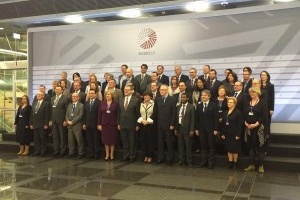Europe’s leaders approve Riga Declaration on TB and MDR-TB
At the conclusion of the first Eastern Partnership Ministerial Conference on Tuberculosis and Its Multidrug-Resistance, the TB Europe Coalition applauds the approval of the Riga Declaration by Ministers of Health, Finance and Social Affairs from across European Union Member States and Eastern Partnership countries.
Riga, 31st March 2015 – At the conclusion of the first Eastern Partnership Ministerial Conference on Tuberculosis (TB) and Its Multidrug-Resistance (MDR-TB), the Tuberculosis Europe Coalition (TBEC) applauds the approval of the Riga Declaration by Ministers of Health, Finance and Social Affairs from across European Union Member States and Eastern Partnership countries.
TBEC would particularly like to congratulate the Latvian
government for taking the initiative to organise this important
meeting as part of their Presidency of the EU Council and the
collaborative efforts of partners across Europe, including the
World Health Organisation, ECDC, the European Commission, the
Global Fund to Fight AIDS, TB and Malaria, the Stop TB
Partnership and civil society.
This meeting comes at
a crucial time in the fight against TB and MDR-TB in Europe. The
European region contends with the highest rates of
multidrug-resistant TB (MDR-TB) worldwide. Fifteen of the
twenty-seven high MDR-TB burden countries in the world are
situated in the region and four of these (Latvia, Lithuania,
Estonia and Bulgaria) are situated in the European Union.
Currently, Europe is failing to tackle MDR-TB effectively. More
than 50% of MDR-TB cases are not detected and less than half are
cured. Without increased political and financial commitment, the
number of MDR-TB cases in Europe could skyrocket, leading
towards the apocalyptic scenario of rising costs and lost lives.
TB and MDR-TB is already estimated to cost European economies an
astonishing €6 billion a year.
“This
meeting and the subsequent signing of this declaration is a step
in the right direction for TB and MDR-TB in Europe. Today
many of our political leaders have signified their commitment to
ending this disease once and for all. As civil society, we will
now work tirelessly to ensure that these commitments are
followed through and the ambition is not lost. The Slovaks
agreeing to keep it as a regional health priority during their
EU Presidency is a fantastic opportunity to keep political
momentum ” said Fanny Voitzwinkler, Head of Global Health
Advocates EU Office and Coordinator of TBEC.
Despite
these steps in the right direction, TBEC would like to express
disappointment that not all European and Eastern Partnership
countries sent high-level political representation. In
particular, TBEC is concerned by the absence of Health
Commissioner Vytenis Andriukaitis who had been expected at the
conference but caused surprise when he pulled out just last
week. The Commissioner however signalled strong support via a
video message delivered to the Conference in which he recognised
that underlying social factors of TB had to be addressed if we
were going to the win this fight. Most importantly, the
Commissioner showed his backing for the Riga Declaration when
stating that it “provides a solid foundation for the
eradication of TB in Europe” and that the Commission will
work jointly with countries to achieve this.
“The
European Commission have reiterated several times during the
conference their intention to work jointly with EU members
states, neighbouring countries, the WHO and civil society in
order to tackle TB effectively. This is significant. It is only
with joint efforts that we will be able to push the agenda
forward for TB elimination in Europe. I am pleased that the
Health Commissioner has sent this message of support and look
forward to hearing in greater detail how they plan to work with
all stakeholders in this fight,” said Lucica Ditiu,
Executive Director of the UN Stop TB Partnership.
As
Marina, a former MDR-TB patient from Romania, said in her
opening speech: “We must redouble our efforts towards
stopping the spread of the disease, and recommit ourselves to
tackling this scourge that drains the life and saps the
potential of so many.” TBEC believes that the approval of
the Riga Declaration marks the first step in the redoubling of
efforts. Those in attendance have now formalised their
commitment to end TB as a public health problem in their
respective countries and to strengthen and formalise regional
collaboration on TB and MDR-TB at the highest political
level.
Translating the approval of the Riga
Declaration into concrete outcomes is now key. It will be
crucial for attendees at the upcoming Eastern Partnership Summit
in May 2015 to endorse the aspirations of the Riga Declaration.
Moreover, we reiterate the point made by Dr Hans Kluge, Director
of the Division of Health Systems and Public Health, and Special
Representative of the Regional Director to prevent and combat
M/XDR-TB in the WHO European Region, that we now look forward to
the next EU Presidencies of Luxembourg and Slovakia to the turn
the outcomes of Riga into EU Council Conclusions.
The TB Europe Coalition is an informal advocacy network of non-governmental organisations and individuals that share a commitment to raising awareness of TB and to increasing the political will to control the diseases throughout the WHO European Region and worldwide; www.tbcoalition.eu.
Source:
TB Europe Coalition
CSO statement – Riga Ministerial Meeting


